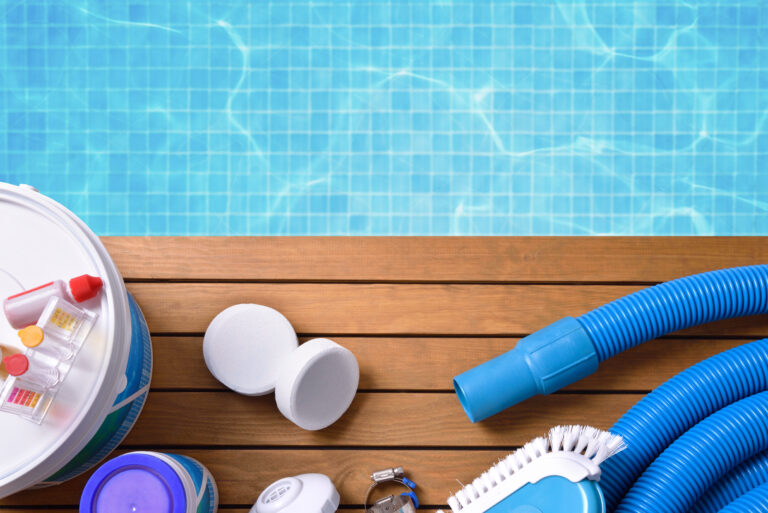
How long do chlorine tablets last? Pool chemicals generally have a shelf life of 3-5 years when properly stored. Pool chlorine is no different, though certain forms are more stable and last longer than others. Keeping chlorine in environments that are consistently cool, dry, and dark will extend the time it remains usable. Knowing how and where to store chlorine tablets and other pool products can help pool owners and operators keep their chemicals safe and save money.
Do Chlorine Tablets Expire?
Do chlorine tablets expire? The simple answer is yes. Like any chemical, chlorine tablets go bad if left long enough or improperly stored. Kept in the right conditions, however, they can remain effective for over five years. Knowing how to store chlorine tablets will ensure that any chlorine tablets left over at the end of the summer swimming season will remain effective next spring.
Chlorine tablets, also known as Trichlor tablets, are the most common type of pool. They come in 1-inch and 3-inch tablets or 3-inch sticks. They contain 90% chlorine and are individually wrapped in plastic, further slowing degradation. Yet, there is no way to determine their effectiveness just by looking at them.
According to the Environmental Protection Agency (EPA), chlorine tablets are sanitizers, so they have all their active ingredients listed on the packaging, along with other chemicals the product contains. Typically, 3-inch chlorine tablets contain 90% chlorine, while other materials, such as water clarifiers, may make up the rest of the active ingredients on some products. Check these added ingredients, as they aid filtration and collect dirt, nixing the need to add other chemicals.
Where & How to Store Chlorine Tablets (and Other Pool Chemicals)
Of all chlorine-based pool products, chlorine tablets have the most extended shelf life. When stored between 50-70°F (10-21° C), chlorine tablets can still have 98% of their original chlorine content after three years, though this depends on where they are stored. A tightly sealed bucket in a cool, dry, and well-ventilated area will keep chlorine-based chemicals stable for longer.
Doing this and keeping them away from direct sunlight and water can allow tablets to last well over five years. Remember, however, that they will degrade if the tablets get too hot. Also, chlorine tablets will dissolve if exposed directly to water, though humidity in the air will not affect them adversely. Generally, depending on how and where chlorine tablets are stored, they should last 3-5 years.
While understanding how and where to store chlorine tablets is important, it’s also important to understand where and how to store other pool chemicals.
Shelf life and storage for various other pool chemicals:
- Algaecides stored in cool, dry, and indoor locations will remain potent for up to five years, though direct sunlight and temperatures above 75°F (24°C) will reduce shelf life; temperatures at or below freezing (at or below 32°F or 0°C) can ruin it.
- Clarifiers can last up to five years when stored in places that are kept cool and out of the sun, though storing them outside, in garages or sheds that reach higher temperatures reduces effectiveness and, when exposed to freezing temperatures, they can become unusable.
- Cyanuric acid, also known as chlorine stabilizer, can remain potent almost indefinitely when stored in properly sealed containers.
- Granular chlorine when kept in airtight containers that are cool and dry can last for over five years, though when stored otherwise and exposed to humidity it can dissolve in under two years.
- Liquid chlorine (sodium hypochlorite) is the most unstable pool chemical, losing 50% of its potency within the first six months and 90% after a year; when exposed to extremely hot or cold temperatures, or sunlight, it degrades even faster.
- Sodium bicarbonate and calcium carbonate (alkalinity & calcium increasers) remain viable for over five years, though shelf life can be extended by keeping it in sealed containers and away from moisture, which can cause clumping.
- Sodium bisulfate and muriatic acid (pH decreaser) tends to last longer due to more robust packaging, with shelf lives of five years, though as acids they will break down containers over time.
- Sodium carbonate or soda ash (pH increaser) remains usable for over five years when kept in airtight containers, though humidity or moist conditions can cause it to clump and harden, causing it to lose effectiveness and eventually convert sodium carbonate to sodium bicarbonate.
- Stain and scale chemicals, also known as stain preventers, can last almost indefinitely when stored indoors in cool, dry locations and kept in tightly sealed containers, though exposure to heat or cold can affect its effectiveness.
Contact Halogen Supply
With over 20 years of experience each on average, Halogen Supply’s expert staff can answer any pool questions you may have. This invaluable wisdom and understanding of pools and the chemicals that keep them clean is at our customers’ disposal. Please contact us for any questions you might have about chlorine tablet storage, swimming pools and their upkeep.
